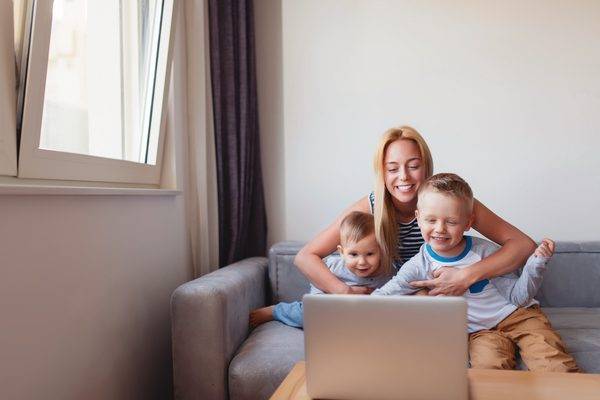You’re social distancing, washing your hands, and trying not to touch your face. But as you do your best to keep yourself and your family safe during the COVID-19 pandemic, it’s just as important to take care of your mental health, too. And that’s no easy task when faced with so much uncertainty. In fact, the CDC has acknowledged the mental stress that comes with experiencing a global pandemic.

We turned to Dr. Leesha Ellis-Cox for help. Dr. Leesha, as she’s affectionately called by her clients, is a board-certified child, adolescent, and adult psychiatrist. She’s based in Birmingham, Alabama, where she serves as medical director for Western Mental Health Center, Inc. Dr. Leesha is also a highly sought-after public speaker and the author of the book Ditch the Mommy Guilt: A Blueprint for the Modern Mommy.
1. Let yourself feel what you feel
As we all adjust to a new normal in the face of the Coronavirus crisis, Dr. Leesha says it’s important that we’re honest about how all of these changes are making us feel.
“So many aspects of our lives are now on hold – no more birthday parties, no more date nights or girls’ night out, and no sporting events. It is vitally important to our mental health to acknowledge all of our feelings, the positive and negative the ones,” Dr. Leesha says. “There is no need to pretend that we are okay or that we have it all figured it out.”
2. Know the difference between a bad day and depression.
“We may have a few sleepless nights or ruminating thoughts as we try to figure out how we are going to pay bills, homeschool our kids, and maintain our sanity,” Dr. Leesha says. But it’s critical to recognize when you’re not just having a bad day but may be experiencing depression or anxiety.
“Depression or anxiety that impairs our ability to function is not normal and may indicate something more,” Dr. Leesha says.
Symptoms of depression include persistently depressed mood, irritability, sleeping excessively to avoid life or insomnia every day, fatigue, difficulty making decisions, hopeless and worthless feelings, feeling like a burden to your family, and thoughts of suicide, Dr. Leesha explains.
Symptoms of anxiety include excessive worry. You’ll feel like your brain is stuck on concerns that are a bit unreasonable. Anxiety can affect you physically, too. You may experience chest pressure and tightness, rapid heart rate, nausea, or even panic attacks. You’ll notice you always feel irritable, tense, and on edge.
“Depression and anxiety disrupt relationships, hinder interactions with your significant other and your children, and make the day-to-day feels insurmountable,” Dr. Leesha says. “It’s not just a rough day; it’s drudgery that lasts for weeks.”
3. Get professional help if you need it
If you are struggling with depression or anxiety, you can get professional even as you shelter in place.
“Many mental health providers are also now incorporating telepsychiatry and teletherapy services to see patients and can offer such services irrespective of one’s insurance status because of the coronavirus quarantine regulations,” Dr. Leesha explains. “Just check with the provider to see what online services they provide.”
Organizations like the American Psychiatric Association, Psychology Today the American Academy of Child and Adolescent Psychiatry, and the Child Mind Institute all offer a wealth of resources to help you find a local psychiatrist or therapist for yourself or your child.
And don’t forget about online therapy platforms like Talkspace and BetterHelp.
“It’s easier than ever for moms to get the help they need,” Dr. Leesha says.
If you or someone you know is experiencing suicidal thoughts, please call the National Suicide Prevention Lifeline at 1-800-273-8255.
4. Practice self-care daily
All the talk on the importance of self-care that’s floating around right now may seem trite, but Dr. Leesha says moms should heed this advice. Self-care is about learning how to manage your worry in healthy ways, Dr. Leesha says.
Here are her suggestions:
- Exercise. Moving your body releases “feel-good” hormones called endorphins that boost your mood.
- Practice mindfulness. Stay present rather than thinking about what already happened or what is to come.
- Journal. This can help you release your anxious thoughts.
- Pray and meditate. This allows you to acknowledge that there is a higher power greater than the problems you are facing.
- Connect with your children. Find ways to connect with your kids intentionally and meaningfully. And yes, dance parties do count.
- Maintain a daily routine. Even though your day no longer resembles what it once was, be sure to shower, comb your hair, get out of your pajamas, adopt regularly scheduled times for work, meals, and relaxation, and practice good sleep hygiene, Dr. Leesha says.
- Unplug when necessary. While it’s important to stay informed if you find yourself overwhelmed by all the coronavirus-related news, turn off the TV, log off the internet, and disconnect from social media.
5. Talk to your children about what’s going on
If your children are old enough to ask questions about what’s happening, don’t be afraid to answer them.
“Our children do not live in a vacuum and are aware that things are different, even preschoolers,” Dr. Leesha says. “Kids have questions, and they worry. But not talking about is not the answer.”
Here are Dr. Leesha’s tips for talking to your children about the COVID-19 pandemic:
- Encourage open dialogue. Ask them what they know, what they don’t understand, and what they’re feeling.
- Be honest. Answer their questions honestly, using language they can easily understand. And don’t be afraid to say, “I don’t know” if you don’t know the answer.
- Be loving and reassuring. Acknowledge their concerns and never be dismissive. But focus on what your family is doing to keep everyone safe.
- Check yourself first. Be sure you are in the position, emotionally, to answer their questions without escalating their fears, Dr. Leesha says.
6. Practice social distancing, not social isolation
“If we isolate ourselves, we risk loneliness that can lead to depression,” Dr. Leesha says. So, make the effort to maintain connections with your family and friends. Use online tools like Zoom, a platform for video conferencing, as well as FaceTime, email, texting, and regular phone calls to keep in touch.
And don’t forget that the Babypalooza app and Babypalooza.com are here to be your virtual village with our online groups, discussion boards, and more.
How are you taking care of your mental health during these uncertain times?



